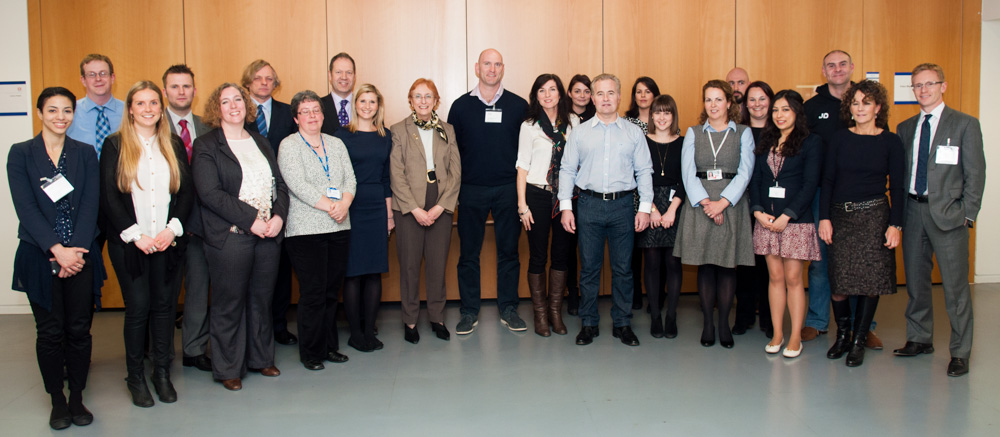
Fundraisers for the Dallaglio Foundation and Cancer Research UK find out what happens in the Oncogenetics lab from researchers Sarah Thomas, Sandra Edwards, Dr Daniel Brewer and Dr Zsofia Kote-Jarai.
Some rather special guests came to visit us at our laboratories recently -- including Lawrence Dallaglio, retired captain of England's rugby union team. They had come to talk to
Ros Eeles, Professor of Oncogenetics in our Division of Genetics and Epidemiology and at our partner hospital The Royal Marsden, about
the £2.5 million prostate cancer genome project that the
Dallaglio Foundation and Cancer Research UK have been funding.
Ros's Oncogenetics team are part of the
International Cancer Genome Consortium (ICGC), a collaboration between cancer specialists and genomics experts from around the world, which seeks to use whole genome sequencing to guide the development of the next generation of personalised cancer treatments. Also visiting us in our labs in Sutton, Greater London, were some of the team's colleagues in the consortium -- from the Cambridge Research Institute and the University of East Anglia.

We took the opportunity to show off our Oncogenetics labs, where patient samples are processed and DNA extracted ready for genome sequencing.
Cancers are triggered and driven by the genetic mutations that we acquire over time as we age. But most mutations cause little or no real harm. Only those which hit specific sites in important genes cause disease, but we don't yet have a full list of what those genes are -- that's the main question that this project seeks to address for prostate cancer.
The process depends on patients from the consortium's partner hospitals, including The Royal Marsden, giving samples. From these, we extract DNA from both healthy and diseased cells, and this this is sent to Illumina -- experts in sequencing technology -- who produce full genome sequences for us. By comparing the sequences of the DNA from the healthy and the diseased cells, we can produce a complete list of the mutations from the tumour.
However, for each individual, that complete list will include not just the important mutations, but also all of those harmless mutations that cells have acquired over time. The next part of the process is to pick out those mutations which are found again and again in tumours, discarding those which occur no more often than one would expect by chance. Our bioinformaticians, in collaboration with the
Sanger Institute, use clever computer systems and statistical methods to do this, and to work out which of the genes are most important. This information then helps to inform our rational drug development programme, which seeks to defeat cancers by targeting the genes that drive them.

Lawrence Dallaglio with the ICR's Professor Ros Eeles (centre), fundraisers from the Dallaglio Foundation and Cancer Research UK, and scientists from the Oncogenetics Team and the International Cancer Genome Consortium.
The prostate cancer genome project has one other important problem to try to tackle. Not all tumours are equal: prostate cancer in particular can come in fast growing aggressive and invasive varieties, and in very slow growing indolent varieties. Some require urgent treatment, but in other cases the risks and side-effects of treatments like surgery and chemotherapy might be disproportionate to the danger posed by the tumour. Doctors need a reliable way to tell the two apart, and current methods just don't provide enough detail.
Over the coming years, as the doctors and nurses at our partner hospitals follow up with patients to monitor how they're doing and how well they respond to treatments, we will continue crunching the numbers to find out which of the mutations we identified are associated with the more aggressive forms of the disease, so that we can focus our efforts on delivering targeted treatments where they're most needed.
comments powered by